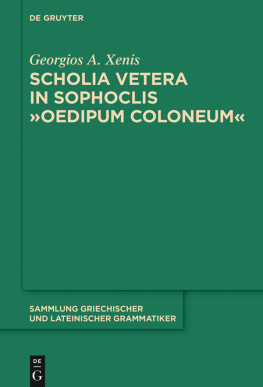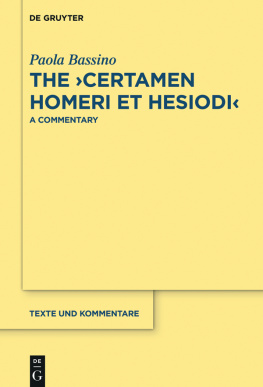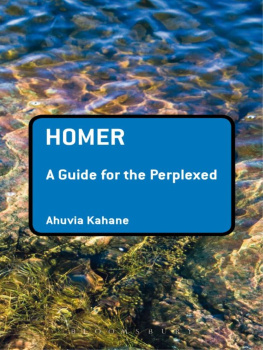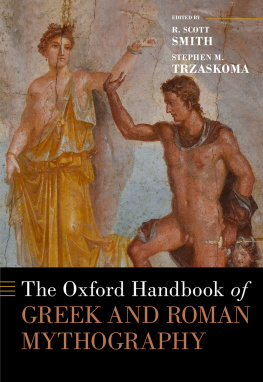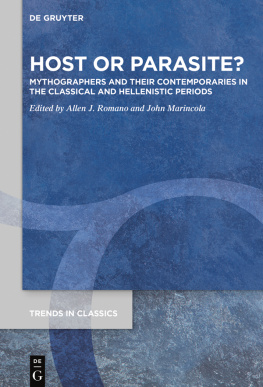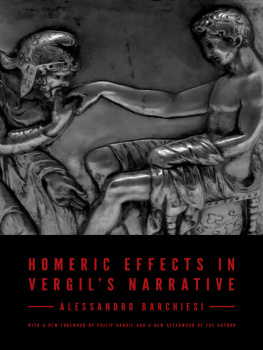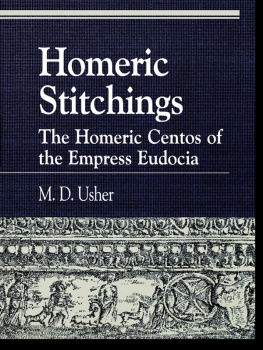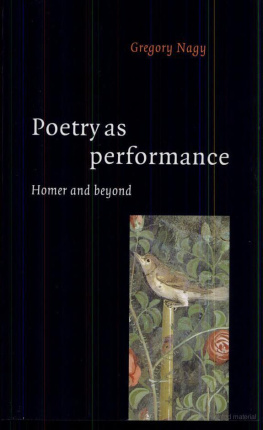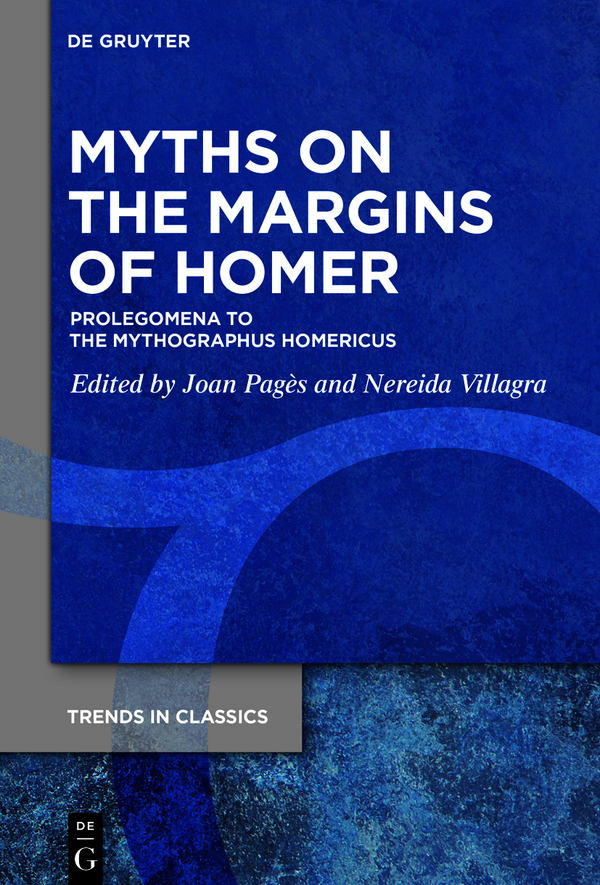Trends in Classics - Supplementary Volumes
Edited by
Franco Montanari
Antonios Rengakos
Volume
ISBN 9783110751154
e-ISBN (PDF) 9783110751192
e-ISBN (EPUB) 9783110751239
Bibliographic information published by the Deutsche Nationalbibliothek
The Deutsche Nationalbibliothek lists this publication in the Deutsche Nationalbibliografie; detailed bibliographic data are available on the Internet at http://dnb.dnb.de.
2022 Walter de Gruyter GmbH, Berlin/Boston
Myths on the Margins of Homer
Trends in Classics Supplementary Volumes
Edited by Franco Montanari and Antonios Rengakos
Associate Editors Stavros Frangoulidis Fausto Montana Lara Pagani Serena Perrone Evina Sistakou Christos Tsagalis
Scientific Committee Alberto Bernab Margarethe Billerbeck Claude Calame Kathleen Coleman Jonas Grethlein Philip R. Hardie Stephen J. Harrison Stephen Hinds Richard Hunter Giuseppe Mastromarco Gregory Nagy Theodore D. Papanghelis Giusto Picone Alessandro Schiesaro Tim Whitmarsh Bernhard Zimmermann
Volume 124
Myths on the Margins of Homer
Prolegomena to the Mythographus Homericus
Edited by Joan Pags and Nereida Villagra
For the preparation of this book, the editors have received funding from the project FFI2016-79906-P (AEI / FEDER, EU) granted by the Government of Spain, the project AGAUR 2017SGR1253 granted by the Government of Catalonia, and funds granted by the Portuguese national funds through FCT Fundao para a Cincia e a Tecnologia, I.P., in the scope of the research project UIDB/00019/2020 and in the scope of the individual post-doctoral scholarship SFRH/BPD/90803/2012.
ISBN 978-3-11-075115-4
e-ISBN (PDF) 978-3-11-075119-2
e-ISBN (EPUB) 978-3-11-075123-9
ISSN 1868-4785
Library of Congress Control Number: 2021950275
Bibliographic information published by the Deutsche Nationalbibliothek
The Deutsche Nationalbibliothek lists this publication in the Deutsche Nationalbibliografie; detailed bibliographic data are available on the Internet at http://dnb.dnb.de.
2022 Walter de Gruyter GmbH, Berlin/Boston
Editorial Office: Alessia Ferreccio and Katerina Zianna
Logo: Christopher Schneider, Laufen
Printing and binding: CPI books GmbH, Leck
www.degruyter.com
List of Tables and Figures
Introduction
Joan Pags
Nereida Villagra
Researching the Mythographus Homericus: methodological perspectives
The idea of the existence of a Mythographus Homericus (henceforth MH) was first formulated in 1892.
The most remarkable corpus of myths in this category, both for its importance and its inaccessibility, are the mythographic scholia to the Iliad and Odyssey, which contain several hundred mythical narratives (historiae). This vast collection of myths, collectively known as the Mythographus Homericus since 1892, circulated as a separate book in antiquity (at least from the first to the fifth century), but it has never been published as a single entity in modern times.
And Alan Cameron in 2004:
A careful comparison of the mythographic Vergil scholia and MH might well repay the effort. Indeed it is one of many aspects of these scholia that would probably repay systematic investigation with the aid of modern tools. But the major problem in conducting any such comparison has hitherto been the lack of anything even remotely resembling a modern edition of the Mythographus Homericus. Paradoxically (and tantalizingly) enough, they were not included in H. Erbses magnificent seven-volume edition published under the title Scholia Graeca in Homeri Iliadem (Berlin 196988). In fact the last edition was also the first, that of Janus Lascaris (Rome 1517).
It is clear then that a commented edition of the MH, independent from the D scholia is a desideratum long-awaited. The current book is to be seen as the prolegomena to such an edition. It gathers the papers presented at the international workshop Mythographus Homericus 125 Years after Panzer: From Scholia to Papyri and to the Digital Era, held in the Faculty of Arts of the University of Lisbon 1617 November 2017, plus a chapter by Lowell Edmunds, who generously joined this project afterwards, and an afterword by Robert Fowler, who unfortunately could not attend the workshop but kindly accepted our invitation to participate in this publication.
The objective of the workshop was to discuss the premises and the methodological issues of the edition and commentary of the MH from different perspectives. We, as organizers, considered that it was vital to open a debate on the hybrid nature of this text, which is to be placed precisely at the crossroads between scholarship and mythography. Such a text needs to be assessed from, at least, three different philological disciplines: textual criticism on Homeric scholarship, papyrology, and mythography.
Indeed, the present book, as a collective volume, intends to reflect diverse, even opposing opinions. Such diversity is, in part, a consequence of the complex nature of the text but also of the difficulty of giving an unambiguous definition of the MH: the term is used to designate the Imperial commentary or commentaries on the Homeric poems which can be postulated on the basis of the papyri, but at the same time it applies to the corpus of fragments attributable to this work, an archipelago of texts in different states of transmission and showing different levels of homogeneity. The volume is structured in four sections in an attempt to bring to the fore the diversity of approaches as well as the need of a commented edition.
The the hypothetical commentary or commentaries that can be postulated as the origin of this long tradition. Indeed, we consider it a healthy position to acknowledge the hermeneutic circle within which we workwhat we establish as the corpus of the MH will inevitably be conditioned by the premises that we set. In his paper, Panzer, the Mythographus Homericus, and fin de sicle German Scholarship, Jordi Pmias examines the historical and cultural context of the German scholar and assesses its impact on Panzers philological endeavour. He offers a description of the way in which Johannes Panzers theory about the MH and the Quellenforschung method continues to influence modern research, and warns about the inappropriateness of adhering to the stemmatic method of textual criticism when dealing with non-stable transmission texts.
The , Filippomaria Pontani offers a comprehensive description of Codex PSI 10, 1173, reassessing fragment 8, an extremely damaged piece of the papyrus. He suggests possible identifications of the lemma and considers the possibility that the scrap does not preserve a fragment of the MH. In the second part of his chapter, he examines the relationship between both the MS Cambridge, Corpus Christi 81 and Leontius Pilatus Latin translation of the Odyssean scholia and the V scholia in relation to several MH historiae.
The , Nereida Villagra provides a description of material attributable to the MH on the Odyssey, a part of the text not established to date. Then she focuses on a case study of a historia with double transmission in the V scholia.
, by Johanna Michels, an expert on Apollodorus, offers an overview of the controversial issue of the relationship between the MH and Apollodorus Library. This is still an open issue, and several solutions and explanations have been proposed by scholarship, all of them partial, however, and not fully convincing. The MH and the


